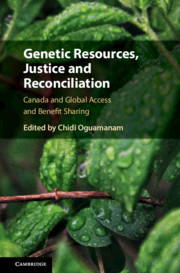Description
Genetic Resources, Justice and Reconciliation
Canada and Global Access and Benefit Sharing
Coordinator: Oguamanam Chidi
Presents the first comprehensive study of Indigenous perspectives on genetic resources, traditional knowledge, and access and benefit sharing in Canada. This book is also available as Open Access.
Language: English
Subject for Genetic Resources, Justice and Reconciliation:
Publication date: 12-2018
298 p. · 15.7x23.5 cm · Hardback
298 p. · 15.7x23.5 cm · Hardback
Description
/li>Contents
/li>Biography
/li>
When the oral history of a medicinal plant as a genetic resource is used to develop a blockbuster drug, how is the contribution of indigenous peoples recognized in research and commercialization? What other ethical, legal, and policy issues come into play? Is it accurate for countries to self-identify as users or providers of genetic resources? This edited collection, which focuses on Canada, is the result of research conducted in partnership with indigenous peoples in that country, where melting permafrost and new sea lanes have opened the region's biodiversity, underscoring Canada's status as a user and provider of genetic resources and associated indigenous knowledge. This work is an important resource for scholars, corporations, indigenous peoples, policymakers, and concerned citizens as Canada and other countries take on the implementation of Access and Benefit Sharing policies over genetic resources and associated indigenous knowledge. This book is also available as Open Access.
Part I. The Evolution of the ABS Policy Landscape in Canada: 1. The ABS Canada initiative: scoping and gauging Indigenous responses to ABS Chidi Oguamanam; 2. Canada and the Nagoya Protocol: towards implementation, in support of reconciliation Timothy J. Hodges and Jock Langford; 3. Aboriginal partnership, capacity building, and capacity development on ABS: the Maritime Aboriginal Peoples Council (MAPC) and ABS Canada experience Chidi Oguamanam and Roger Hunka; Part II. Hurdles to ABS: Conceptual Questions, Practical Responses and Paths Forward: 4. Unsettling Canada's colonial constitution: a response to the question of domestic law and the creation of an access and benefit sharing regime Joshua Nichols; 5. Making room for the Nagoya Protocol in Nunavut Daniel W. Dylan; 6. Implications of the evolution of Canada's three orders of government for ABS implementation Fred Perron-Welch and Chidi Oguamanam; 7. Biopiracy flashpoints and increasing tensions over ABS in Canada Chidi Oguamanam and Christopher Koziol; 8. Applying Dene Law to genetic resources access and knowledge issues Larry Chartrand; 9. Access and benefit sharing in Canada: glimpses from the national experiences of Brazil, Namibia and Australia to inform indigenous-sensitive policy Freedom-Kai Phillips; Part III. New Technological Dynamics and Research Ethics: Implications for ABS Governance: 10. Access and benefit sharing in the age of digital biology Peter W. B. Phillips, Stuart J. Smyth and Jeremy de Beer; 11. ABS: big data, data sovereignty, and digitization – a new indigenous research landscape Chidi Oguamanam; 12. Ethical guidance for access and benefit sharing: implications for reconciliation Kelly Bannister; 13. Mapping the patterns of underestimated researcher-indigenous peoples collaborations – toward independent implementation of ABS principles Thomas Burelli; 14. ABS, reconciliation, and opportunity Chidi Oguamanam.
Chidi Oguamanam is called to the Bar in Nigeria and Canada and is a member of Nigerian Bar Association and Nova Scotia's Barristers' Society. In addition to public speaking engagements nationally and internationally, Dr Oguamanam provides technical and expert consulting and support services in his areas of work for states and sub-state actors, intergovernmental bodies, Indigenous and local communities in developed and newly industrializing countries and elsewhere. He is also the author of: International Law and Indigenous Knowledge: Intellectual Property, Plant Biodiversity, and Traditional Medicine (2006) and Intellectual Property in Global Governance: A Development Question (2011).
© 2024 LAVOISIER S.A.S.




